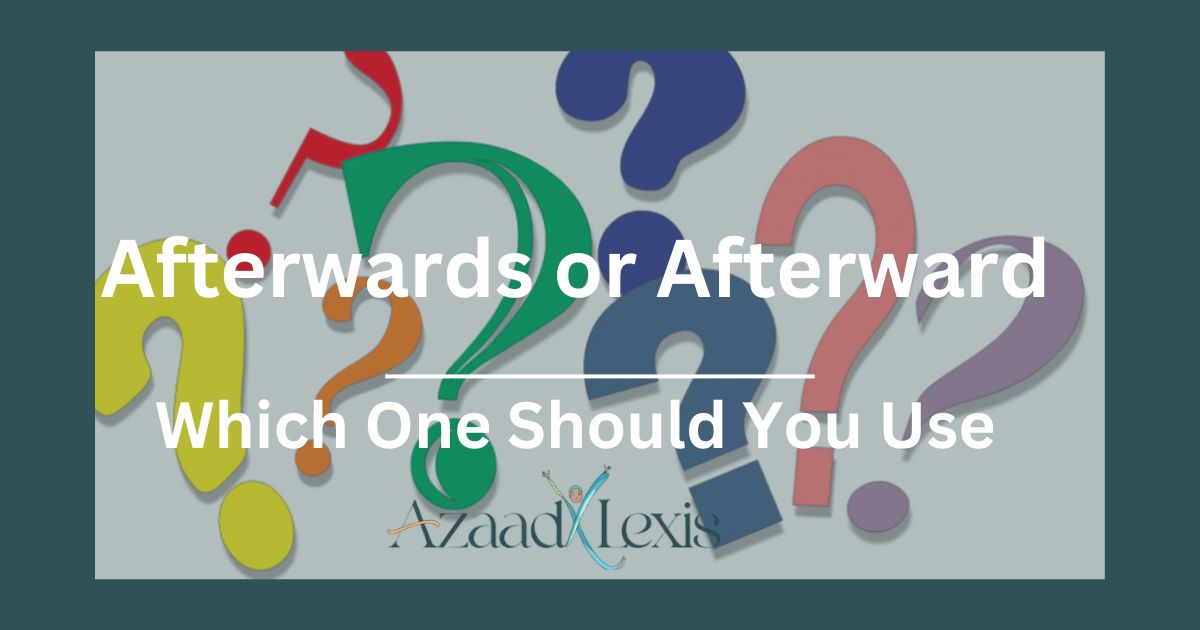If you’ve ever found yourself hesitating between “afterwards” and “afterward,” you’re not alone. These two words often confuse even the most seasoned writers and speakers. While they are very similar in meaning, subtle differences in usage and regional preferences can influence the choice.
In this article, we’ll explore understanding the basics of afterwards and afterward, delve into practical examples to make your choice easier, and help you decide which one fits your writing best.
Understanding the Basics of Afterwards and Afterward
At the core, “afterwards” and “afterward” mean the same thing—they both refer to something happening later or subsequently. However, the key difference comes in their usage and regional preferences.
What do ‘afterwards’ and ‘afterward’ mean?
Both words refer to actions or events that take place after a certain point in time. For instance, “She went to the store, and afterward, she made dinner.” Or, “We’ll discuss the project afterwards.”
Why Is There Confusion Between These Terms?
So, why do these two words often get mixed up? The confusion arises from the fact that they can both be used in similar contexts, but their linguistic roots and regional preferences play a major role in choosing the correct one.
Some people prefer using “afterward” because it sounds more streamlined and less formal. “Afterwards” tends to be used in more casual settings or by those who follow British English conventions.
Key Differences Between Afterwards and Afterward
The main key difference between “afterwards” and “afterward” lies in regional preferences. “Afterward” is more common in American English, while “afterwards” is typically used in British English. Both words mean the same thing, referring to events happening later, but the choice depends on the specific audience and context.
Regional Preferences: British vs American English
The key difference often boils down to regional preferences. In British English, “afterwards” is typically more popular, while American English speakers tend to favor “afterward.”
For example, if you’re reading a novel by a British author, you’ll likely encounter “afterwards” more frequently. In contrast, American novels or articles will likely use “afterward.”
Contexts Where One Is Preferred Over the Other
While both words have the same meaning, “afterward” is more common in American English, especially in formal writing. On the other hand, “afterwards” is often preferred in more conversational or informal settings in British English.
Practical Examples and Usage Tips
To help you remember which term to use in a particular scenario, here are some practical examples and usage tips:
Everyday Scenarios for ‘Afterward’
- “We’ll grab lunch, and afterward, we can go for a walk.”
- “She finished her homework, and afterward, she watched TV.”
Here, “afterward” is used in a simple sentence to convey an event happening later on. This is typically seen in American English writing and conversation.
Read this Blog: Draught Or Draft: Understanding The Differences
Everyday Scenarios for ‘Afterwards’
- “The guests left, and afterwards, we cleaned up the house.”
- “We went to the park, and afterwards, we had ice cream.”
In these examples, “afterwards” is used to describe an event that happened after something else. This is more common in British English or casual speech.
Alternatives and Synonyms for Afterward and Afterwards
Both words have synonyms and alternatives that might help you avoid repetition in your writing. Here are a few:
Synonyms That Work in Both Contexts
- Later
- Subsequently
- Then
- Following
For example, instead of writing “Afterward, we went to dinner,” you could say “Later, we went to dinner.”
More Specific Alternatives for Varied Contexts
If you’re looking for more specific synonyms, depending on the situation, you could use words like:
- Consequently (for cause and effect)
- Thereafter (for more formal or academic contexts)
- At a later time (for a neutral alternative)
For instance, “The meeting ended, and consequently, we started planning for next week.”
Origins and Evolution of Both Terms
Origins of ‘Afterward’: The term “afterward” originates from Old English, where it was written as “æfterweard,” meaning “in the direction of after.” Over time, it evolved into the modern form “afterward.”
Historical Roots of ‘Afterward’
The word “afterward” has roots in Old English, where it was originally written as “æfterweard,” meaning “in the direction of after.” Over the years, it evolved into the more streamlined “afterward.”
Historical Roots of ‘Afterwards’
On the other hand, “afterwards” can be traced back to Middle English, where it was used to denote something that happens after a specific event. Over time, the word evolved to its current form, “afterwards,” and became the preferred version in British English.
Conclusion
Choosing between “afterward” and “afterwards” really boils down to your audience and regional preferences. For American English, “afterward” is generally the go-to choice, particularly in formal writing. However, if you’re writing for a British audience, “afterwards” might be the better fit.To sum up, both terms convey the same idea of something happening later, but keeping in mind your audience’s language preferences and context will help you make the best choice.
Whether you choose “afterward” or “afterwards,” remember that consistency is key to good writing.By using the tips and examples above, you should now feel more confident about when to use “afterward” versus “afterwards.” Keep practicing, and soon, it’ll become second nature!

